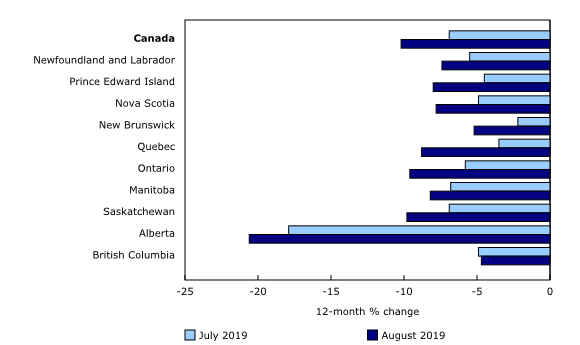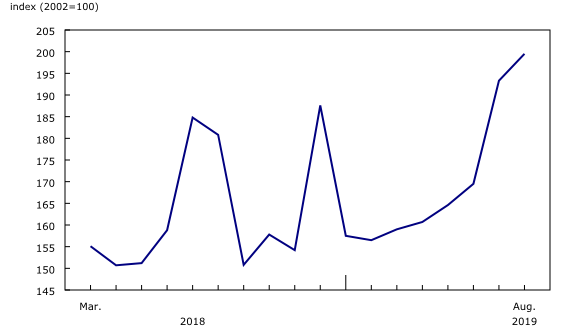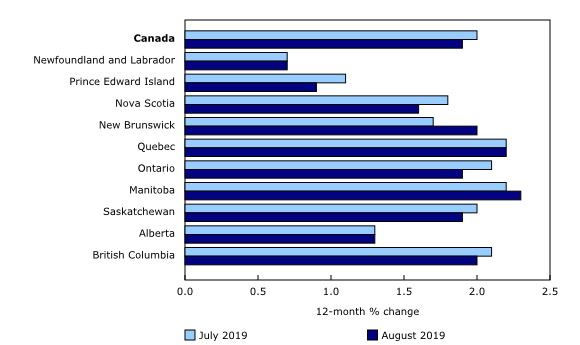Consumer Price Index, August 2019
Archived Content
Information identified as archived is provided for reference, research or recordkeeping purposes. It is not subject to the Government of Canada Web Standards and has not been altered or updated since it was archived. Please "contact us" to request a format other than those available.
Released: 2019-09-18
August 2019
1.9% 
(12-month change)
The Consumer Price Index (CPI) rose 1.9% on a year-over-year basis in August, down from a 2.0% increase in July, primarily due to lower gasoline prices. Excluding gasoline, the CPI rose 2.4%, matching the increase in July.
The CPI has grown by 1.9% or more on a year-over-year basis for six consecutive months, after reaching a low of 1.4% in January of this year. The broad-based gains in the CPI over the past two quarters have coincided with strength in Canadian labour market conditions.
On a seasonally adjusted monthly basis, the CPI was unchanged in August following a 0.4% increase in July.
Visit the new Consumer Price Index Portal!
Statistics Canada has launched a new Consumer Price Index (CPI) Portal as part of a suite of portals for prices and price indexes. The CPI Portal centralizes all CPI information and products in one convenient location on the Statistics Canada website. This webpage serves as a single point of access for users to find CPI data, publications, interactive tools, and announcements highlighting new products and upcoming changes to the CPI.
Highlights
Consumers pay less for gasoline, while natural gas prices rise
Consumer prices for gasoline fell 10.2% in the 12 months to August, following a 6.9% decline in July. Global oil prices fell slightly in August due to higher production and soft international demand, remaining below the elevated levels of 2018.
In contrast, natural gas prices rose 5.8% year over year in August, up from a 3.2% increase in July. This was attributable to a bounce back in prices from earlier this summer, when gas pipeline maintenance was ongoing and inventories were higher.
Air fares increase on jet groundings and summer travel
Air transportation prices rose 10.3% year over year in August after increasing 4.6% in July. The increase was largely related to continued reductions in operational aircraft capacity during the final month of the busy summer travel season, due to the March grounding of the Boeing 737 MAX aircraft models.
Cheaper vegetables and meat for consumers
Canadians paid 6.5% less for fresh vegetables in August compared with July, marking the largest month-over-month decline in five years. This led to slower year-over-year growth in the fresh vegetables index as transitory pressures stemming from inclement weather in agricultural regions, which boosted the index in May, June and July, eased. The fresh fruit index (-1.0%) declined on a year-over-year basis for the second consecutive month.
The cost of meat grew 4.8% on a year-over-year basis in August, after rising 5.5% in July. The slowdown was partially attributable to a 2.7% month-over-month decline in the fresh or frozen pork index, coinciding with increased domestic supply owing to foreign restrictions on Canadian pork exports.
Regional highlights
The homeowners' replacement cost index, which tracks the price of new homes, declined in five provinces. The index fell year over year in Saskatchewan (-3.4%) and Alberta (-3.3%), continuing the downward trend since the beginning of 2018. It also fell in Ontario (-0.4%), driven by the largest month-over-month decline in the province since 2009.
Canadians pay less for hotels, except in New Brunswick
The cost of traveller accommodation (-6.7%) fell on a year-over-year basis for the 14th consecutive month. The decrease was widespread, as the index fell in all but one province. New Brunswick was the lone province to report higher year-over-year prices for traveller accommodation, which was attributable, in part, to higher demand related to a festival held in the region in August.
Note to readers
Real-time data tables
Real-time data table 18-10-0259-01 will be updated on September 30.
Next release
The Consumer Price Index for September will be released on October 16.
Products
The interactive Consumer Price Index Data Visualization Tool is available on the Statistics Canada website.
More information about the concepts and use of the Consumer Price Index (CPI) is available in The Canadian Consumer Price Index Reference Paper (62-553-X).
For information on the history of the CPI in Canada, consult the publication Exploring the First Century of Canada's Consumer Price Index (62-604-X).
Two videos, "An Overview of Canada's Consumer Price Index (CPI)" and "The Consumer Price Index and Your Experience of Price Change," are available on Statistics Canada's YouTube channel.
Contact information
For more information, or to enquire about the concepts, methods or data quality of this release, contact us (toll-free 1-800-263-1136; 514-283-8300; STATCAN.infostats-infostats.STATCAN@canada.ca) or Media Relations (613-951-4636; STATCAN.mediahotline-ligneinfomedias.STATCAN@canada.ca).
- Date modified:







